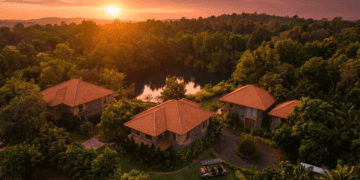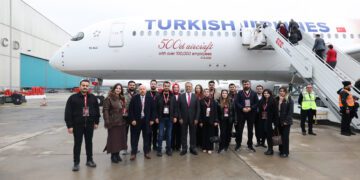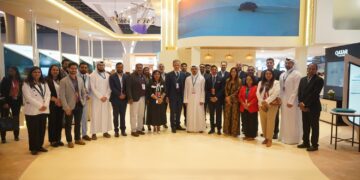
Mercure Kathmandu Sukedhara Heights is a significant addition to Nepal’s hospitality landscape. What inspired this project, and what sets it apart from other hotels in the region?
Mercure Kathmandu Sukedhara Heights is inspired by Kathmandu’s rich cultural heritage and the desire to offer both business and leisure travellers an experience that seamlessly blends modern comfort with authentic Nepali traditions. Rooted in Mercure’s “Discover Local” philosophy, the hotel is designed to celebrate the city’s unique identity, from its architecture and artistry to its warm hospitality and vibrant culinary scene. Every element of the property reflects the essence of Nepal, creating an immersive experience that resonates with guests seeking deeper cultural connections.
What sets Mercure Kathmandu Sukedhara Heights apart is its thoughtfully curated design, incorporating traditional craftsmanship such as intricate wooden carvings, Mithila art, and symbolic sculptures. The hotel’s standout feature is its rooftop infinity pool and lounge—one of the few in the city—offering breathtaking 180-degree views of the Kathmandu skyline and the Himalayas, with spectacular sunrise vistas. Enhancing this serene retreat is a large LED screen, providing a unique entertainment space.
Guests can indulge in a diverse culinary journey,from DYNE (All -Day -Dining) restaurant to Zaiqa, the hotel’s signature Indian specialty restaurant, to Sopra Italiano, offering alfresco Italian dining, and The Kove, a stylish lobby bar serving a blend of local and global flavours. Our rooftop bar SukraBar, which name is derived from Friday in Nepali which has outdoor and indoor bar. Strategically located just 4 km from Tribhuvan International Airport, the hotel ensures easy access to key landmarks, embassies, and renowned sites such as Boudhanath Stupa, Thamel, and Durbarmarg.
Given Nepal’s focus on sustainable tourism, what are some key challenges the industry faces, and how can India play a role in addressing them?
Nepal’s tourism industry holds immense potential, but sustainable growth comes with its challenges. Environmental concerns, including the impact of tourism on fragile ecosystems, waste management, and pollution, require strategic solutions to preserve the country’s natural beauty. Equally important is ensuring that local communities benefit equitably from tourism while safeguarding Nepal’s rich cultural heritage from the pressures of overtourism. Additionally, strengthening infrastructure—be it transportation, accommodation, or skilled workforce development—is crucial to creating a seamless travel experience.
India, with its strong ties to Nepal, can play a meaningful role in addressing these challenges. Collaboration in sustainable tourism practices, investment in eco-friendly infrastructure, and knowledge-sharing in responsible tourism development can greatly contribute to Nepal’s long-term growth. As one of Nepal’s largest tourism source markets, India’s support in promoting cross-border travel with sustainable initiatives and cultural exchanges can further strengthen the sector while ensuring that growth remains inclusive and environmentally responsible.
India has a strong and evolving hospitality sector. In your opinion, what key strategies can further enhance its global standing?
India’s hospitality sector has immense potential to strengthen its global standing by focusing on innovation, sustainability, and service excellence. Travelers today seek more than just accommodation—they look for cultural immersion, wellness retreats, and personalized services. Integrating these elements will create distinctive experiences.
Sustainability must be at the core, with responsible tourism practices, energy efficiency, and waste reduction becoming industry standards. Investing in world-class infrastructure, seamless connectivity, and smart hospitality solutions—such as AI-driven guest services and digital integrations—can enhance efficiency and guest satisfaction.
Upskilling the hospitality workforce through global collaborations and training initiatives will ensure service excellence remains a defining factor. By integrating these strategies, India can elevate its position as a preferred destination for both business and leisure travelers, driving long-term growth and global competitiveness.
A crucial aspect of enhancing India’s global standing in hospitality lies in the commitment to offering a seamless blend of international standards and local authenticity, delivering memorable experiences through attentive service, culturally enriched design, and diverse amenities. This echoes the approach of successful hospitality industries elsewhere, like Nepal, which focuses on blending international best practices with local charm. By focusing on these aspects, India’s hospitality industry can elevate service standards, meet the evolving needs of modern travelers, and strengthen the overall guest experience.
Consistency in service standards, achieved through rigorous training and quality control, ensures seamless guest experiences, enhancing convenience and personalization. This includes anticipating guest needs, providing efficient and courteous service, and maintaining a high level of professionalism across all touchpoints. Most importantly, embracing cultural authenticity—integrating local traditions, cuisine, and decor—can create truly memorable stays. Offering unique experiences that showcase the local culture will differentiate India from other destinations and attract travelers seeking authentic and enriching experiences. Like Nepal’s focus on integrating local traditions and cuisine, India can utilize its diverse cultural heritage to create unique and compelling offerings. By blending innovation with heritage, India can set new benchmarks for world-class hospitality.
The hospitality and tourism industry has seen a dynamic transformation worldwide. What trends do you believe will shape its future, particularly in South Asia?
The hospitality and tourism industry in South Asia is undergoing a significant transformation, driven by evolving traveler expectations and global trends. Several key trends are shaping its future. Experiential travel is paramount, with guests no longer satisfied with just a place to stay. They crave immersive experiences, cultural immersion, authentic local interactions, and personalized services. This includes everything from culinary adventures and heritage walks to community engagement programs and unique accommodations. Sustainability is no longer optional but essential. Travelers are increasingly conscious of their environmental footprint, driving demand for eco-friendly accommodations, carbon-conscious travel options, and regenerative tourism initiatives. Hotels are adopting sustainable practices, from energy efficiency and waste reduction to supporting local communities and conservation efforts.
Technology integration is revolutionizing hospitality. AI-driven customer service, seamless digital check-ins, smart room automation, and immersive virtual experiences are becoming commonplace. Digital tools, like virtual reality previews and data-driven personalization, empower travelers to explore and customize their stays before arrival. Wellness tourism is a major driver of travel. Holistic retreats, nature-based escapes, and personalized wellness programs are witnessing strong growth. Travelers are seeking rejuvenating experiences that combine relaxation, mindfulness, and healthy living. The rise of the sharing economy has pushed hotels to offer more flexible and community-oriented accommodations. This includes integrating innovative technologies and personalized services to meet the evolving expectations of today’s travelers. Finally, a focus on local authenticity is crucial. Travelers increasingly seek authentic experiences that showcase the local culture, cuisine, and traditions. Hotels are incorporating local design elements, offering regional culinary experiences, and partnering with local artisans and communities.
Looking ahead, the future of South Asia’s hospitality industry holds immense promise. International hotel chains like Mercure are playing a pivotal role in this growth by introducing globally recognized brands and raising service standards. For example, Mercure Kathmandu Sukedhara Heights contributes significantly to Nepal’s tourism sector by attracting international tourists, generating local employment, and showcasing Nepali heritage through its design and immersive cultural experiences. This reinforces Nepal’s position as a desirable destination and supports the broader strategy of introducing a variety of Accor brands to cater to diverse traveler needs. This expansion of hotel options, from luxury to economy, enriches Nepal’s tourism landscape and supports the growth of the hospitality sector. This model can be replicated across South Asia, driving growth and raising standards throughout the region
With the growing influx of Indian travellers to Nepal, how does Mercure Kathmandu Sukedhara Heights plan to cater to their preferences and enhance their travel experience?
Nepal’s close cultural and geographical ties with India, along with open borders and seamless connectivity, make it an accessible and favoured destination for Indian travellers. The property is designed to enhance this experience by offering a balance of familiar comforts and authentic local charm.
Mercure Kathmandu Sukedhara Heights enhances this journey by providing a stay that reflects the warmth and authenticity of Nepali hospitality. Thoughtfully designed spaces, personalized service, and proximity to iconic sites like Boudhanath Stupa and Pashupatinath Temple allow guests to experience the city’s cultural depth with ease. Whether exploring Nepal’s traditions, architecture, or way of life, the hotel serves as the perfect gateway for Indian travellers to rediscover shared histories while enjoying world-class comfort.
Is there any more information that you would like to share with us?
Mercure Kathmandu Sukedhara Heights is committed to providing a truly immersive and sustainable experience for all our guests. We believe in showcasing the best of Nepali culture and hospitality while minimizing our environmental impact. We are constantly striving to innovate and adapt to the evolving needs of travelers, ensuring that their stay with us is both memorable and meaningful. We are also exploring partnerships with local communities and artisans to further enhance the guest experience and contribute to the local economy. We believe that by focusing on these key areas, we can contribute to the growth of sustainable tourism in Nepal and solidify our position as a leading hospitality provider in the region.
Follow BOTT on LinkedIn, Facebook, Twitter & Instagram
Subscribe BOTT Channels on WhatsApp & Telegram to receive real time updates



































